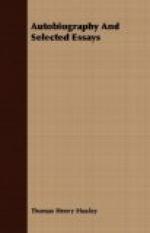[Footnote 71: Rev. Mr. Gunn (1800-1881): an English naturalist. Mr. Gunn sent from Tasmania a large number of plants and animals now in the British Museum.]
[Footnote 72: “the whirligig of time”: cf. Shakespeare, Twelfth Night, Act V, se. I, l. 395.]
[Footnote 73: Euphrates and Hiddekel: cf. Genesis ii, 14.]
[Footnote 74: the great river, the river of Babylon: cf. Genesis xv, 18]
[Footnote 75: Without haste, but without rest: from Goethe’s Zahme Xenien. In a letter to his sister, Huxley says: “And then perhaps by the following of my favorite motto,—
“’Wie das
Gestirn,
Ohne Hast,
Ohne Rast’—
something may be done,
and some of Sister Lizzie’s fond
imaginations turn out
not altogether untrue.” The quotation entire
is as follows:—
Wie das Gestirn,
Ohne Hast,
Aber ohne Rast,
Drehe sich jeder
Um die eigne Last.]
THE PRINCIPAL SUBJECTS OF EDUCATION (1882)
[Footnote 76: The Principal Subjects of Education: an extract from the essay, Science and Art in Relation to Education.]
[Footnote 77: this discussion: “this” refers to the last sentence in the preceding paragraph, in which Huxley says that it will be impossible to determine the amount of time to be given to the principal subjects of education until it is determined “what the principal subjects of education ought to be.”]
[Footnote 78: Francis Bacon: cf. note [Footnote 26].]
[Footnote 79: the best chance of being happy: In connection with Huxley’s work on the London School Board, his biographer says that Huxley did not regard “intellectual training only from the utilitarian point of view; he insisted, e. g., on the value of reading for amusement as one of the most valuable uses to hardworked people.”]
[Footnote 80: “Harmony in grey”: cf. with l. 34 in Browning’s Andrea del Sarto.]
[Footnote 81: Hobbes (1588-1679): noted for his views of human nature and of politics. According to Minto, “The merits ascribed to his style are brevity, simplicity and precision.”]
[Footnote 82: Bishop Berkeley (1685-1753): an Irish prelate noted for his philosophical writings and especially for his theory of vision which was the foundation for modern investigations of the subject. “His style has always been esteemed admirable; simple, felicitous and sweetly melodious. His dialogues are sustained with great skill.” Minto’s Manual of English Prose Literature.]
[Footnote 83: We have been recently furnished with in prose: The Iliad of Homer translated by Lang, Leaf and Myers, the first edition of which appeared in 1882, is probably the one to which Huxley refers. The Odyssey, translated by Butcher and Lang, appeared in 1879. Among the best of the more recent translations of Homer are the Odyssey by George Herbert Palmer; the Iliad by Arthur S. Way, and the Odyssey by the same author.]




